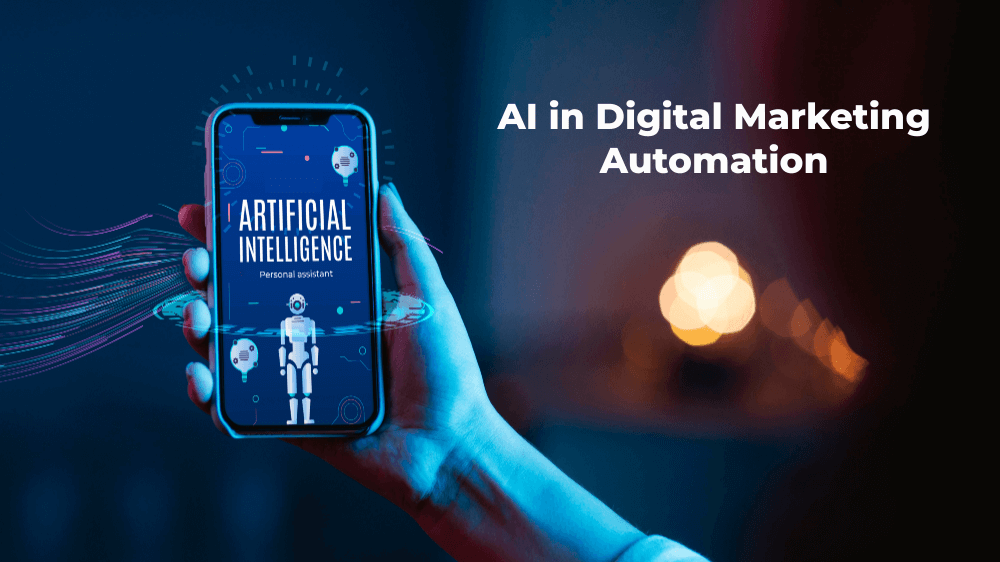
In today’s digitally-driven world, the marketing landscape is undergoing a profound transformation, thanks to the integration of artificial intelligence (AI). Digital marketing automation, once a promising concept, has become a reality, empowering businesses to streamline processes, enhance customer experiences, and drive unprecedented growth. At the heart of this evolution lies AI, revolutionizing how brands engage with their audience, optimize campaigns, and harness the power of data.
As we delve into the realm of AI in digital marketing automation, it becomes increasingly evident that its impact transcends mere optimization—it’s about redefining the very essence of marketing itself. From personalized recommendations to predictive analytics, and chatbots to dynamic pricing strategies, AI is not just a tool but a catalyst for innovation and efficiency.
In this blog post, we will explore the pivotal role of artificial intelligence in digital marketing automation. We’ll delve into its applications, benefits, challenges, and future trends, shedding light on how businesses can leverage AI to stay ahead in an ever-evolving digital landscape. So, let’s embark on this journey to unravel the transformative power of AI in shaping the future of marketing.
A. Definition of digital marketing automation
Digital marketing automation refers to the use of software platforms and technologies to automate repetitive tasks and workflows within marketing campaigns and processes. These tasks can include email marketing, social media posting, ad placements, lead nurturing, and more. By leveraging automation tools, marketers can streamline their operations, improve efficiency, and deliver personalized experiences to their audience at scale. Digital marketing automation allows businesses to automate routine tasks, freeing up time and resources to focus on strategic initiatives and creative endeavors.
B. Emergence of artificial intelligence in marketing
The emergence of artificial intelligence (AI) in marketing represents a paradigm shift in how businesses approach customer engagement, data analysis, and campaign optimization. As AI technologies continue to evolve, marketers are increasingly harnessing their capabilities to gain deeper insights into consumer behavior, deliver highly targeted messaging, and drive measurable results.
AI’s integration into marketing strategies has been propelled by advancements in machine learning algorithms, natural language processing, and predictive analytics. These technologies enable marketers to sift through vast amounts of data, uncover patterns, and extract actionable insights with unprecedented speed and accuracy.
Moreover, AI-powered tools such as chatbots, virtual assistants, and recommendation engines have revolutionized customer interactions, providing personalized experiences at every touchpoint along the buyer’s journey. By leveraging AI-driven automation, marketers can engage with prospects in real time, anticipate their needs, and deliver relevant content tailored to their preferences.
The rise of AI in marketing signifies a fundamental shift towards data-driven decision-making and adaptive strategies. With AI’s ability to analyze data in real time and adapt to changing market dynamics, businesses can stay agile and responsive in an increasingly competitive landscape.
C. Importance of AI in optimizing digital marketing processes
Artificial intelligence (AI) plays a pivotal role in optimizing digital marketing processes by revolutionizing how businesses analyze data, personalize content, and automate campaign management. Its importance lies in its ability to extract valuable insights from vast datasets, enabling marketers to make data-driven decisions and achieve greater efficiency and effectiveness in their strategies.
Enhanced Data Analysis:
AI algorithms can analyze large volumes of data in real time, uncovering trends, patterns, and correlations that human analysis might overlook. By leveraging AI-powered analytics, marketers gain valuable insights into consumer behavior, preferences, and purchasing patterns, allowing them to tailor their marketing strategies accordingly.
Personalized Content:
AI-driven personalization enables marketers to deliver highly relevant and engaging content to individual consumers based on their preferences, behaviors, and past interactions. Through techniques such as predictive analytics and recommendation engines, AI empowers marketers to create personalized experiences that resonate with their target audience, ultimately driving higher engagement and conversion rates.
Automation of Campaign Management:
AI automates repetitive tasks and workflows within digital marketing campaigns, freeing up valuable time and resources for marketers to focus on strategy and creativity. From ad placement optimization to email segmentation and scheduling, AI streamlines campaign management processes, improving efficiency and scalability while reducing manual errors.
Improved Targeting and Optimization:
AI-powered tools, such as predictive modeling and dynamic pricing algorithms, enable marketers to target the right audience with the right message at the right time. By continuously analyzing data and refining targeting parameters, AI helps marketers optimize their campaigns for maximum impact and ROI, ultimately driving better results and revenue generation.
Adaptive and Responsive Strategies:
AI enables marketers to adapt and respond to changing market dynamics and consumer preferences in real time. By monitoring key performance indicators (KPIs) and leveraging predictive analytics, AI empowers marketers to identify emerging trends, adjust their strategies accordingly, and stay ahead of the competition in today’s fast-paced digital landscape.
II. Understanding AI in Digital Marketing
Artificial intelligence (AI) is revolutionizing the landscape of digital marketing, fundamentally changing how businesses engage with their audience and optimize their marketing efforts. To comprehend the role of AI in digital marketing, it’s essential to explore its definition, types, and various applications within the realm of marketing automation.
A. Definition and types of artificial intelligence
Artificial intelligence encompasses a broad spectrum of technologies and algorithms designed to mimic human intelligence, enabling machines to perform tasks that typically require human cognition.
Within the realm of AI, there are several key types, including machine learning, natural language processing (NLP), computer vision, and deep learning. Each type has its unique capabilities and applications in digital marketing.
B. Applications of AI in digital marketing automation
1. Customer segmentation and targeting
AI algorithms analyze vast datasets to segment audiences based on demographics, behaviors, and preferences, enabling marketers to target their campaigns with precision.
2. Personalization of content and recommendations
AI-powered recommendation engines deliver personalized content, product recommendations, and offers tailored to each user’s interests and past interactions.
3. Predictive analytics for campaign optimization
AI utilizes predictive analytics to forecast future trends, identify potential opportunities, and optimize marketing campaigns in real time for maximum effectiveness.
4. Chatbots and virtual assistants for customer support
AI-driven chatbots and virtual assistants provide immediate responses to customer inquiries, resolve issues, and facilitate seamless interactions, enhancing the overall customer experience.
5. Dynamic pricing strategies
AI algorithms analyze market conditions, competitor pricing, and consumer demand to dynamically adjust pricing strategies, maximizing revenue and profitability.
C. Case studies highlighting successful AI implementations in digital marketing
Explore real-world examples of businesses leveraging AI to achieve significant results in areas such as customer engagement, lead generation, and revenue growth. Case studies provide concrete evidence of AI’s effectiveness in driving tangible business outcomes in digital marketing.
By gaining a comprehensive understanding of AI’s role in digital marketing, businesses can unlock new opportunities, streamline processes, and drive meaningful engagement with their target audience in today’s competitive digital landscape.
III. Benefits of AI in Digital Marketing Automation
Artificial intelligence (AI) offers a multitude of advantages when integrated into digital marketing automation processes. These benefits not only enhance efficiency but also drive significant improvements in customer experiences and overall campaign performance.
Also Read: Basics of Digital Marketing
A. Enhanced efficiency and productivity
- Automation of Repetitive Tasks: AI automates time-consuming and repetitive tasks such as data analysis, content creation, and campaign optimization, allowing marketers to focus on high-value activities.
- Streamlined Workflows: By streamlining workflows and eliminating manual interventions, AI reduces the likelihood of errors and accelerates the pace of marketing operations, leading to greater efficiency and productivity.
B. Improved customer experiences and engagement
- Personalization at Scale: AI-powered personalization enables marketers to deliver tailored content, recommendations, and offers to individual customers based on their preferences, behaviors, and past interactions, enhancing engagement and loyalty.
- Real-Time Interactions: AI-driven chatbots and virtual assistants provide instantaneous responses to customer inquiries, deliver personalized assistance, and facilitate seamless interactions across various touchpoints, resulting in enhanced customer satisfaction and retention.
C. Data-driven decision-making
- Actionable Insights: AI analyzes large volumes of data in real time to uncover actionable insights, trends, and patterns, empowering marketers to make informed decisions and optimize campaigns for maximum impact.
- Predictive Analytics: AI utilizes predictive analytics to forecast future trends, anticipate customer behavior, and identify growth opportunities, enabling marketers to stay ahead of the curve and proactively adjust their strategies.
D. Cost-effectiveness and ROI optimization
- Resource Optimization: AI helps optimize resource allocation by identifying areas of inefficiency, reallocating budgets, and maximizing the ROI of marketing initiatives.
- Continuous Improvement: Through iterative learning and optimization, AI-driven algorithms continually refine strategies, campaigns, and targeting parameters, ensuring ongoing improvements in performance and ROI over time.
IV. Challenges and Considerations
While the integration of artificial intelligence (AI) in digital marketing automation offers numerous benefits, it also presents several challenges and considerations that businesses must address to maximize its effectiveness and mitigate potential risks.
A. Data privacy and ethical concerns
- Data Security: AI relies heavily on data, raising concerns about data privacy, security breaches, and compliance with regulations such as GDPR and CCPA.
- Ethical Use of Data: Marketers must ensure the ethical collection, storage, and usage of customer data to maintain trust and transparency with consumers.
B. Integration with existing marketing technologies
- Compatibility Issues: Integrating AI-powered solutions with existing marketing technologies and legacy systems may pose compatibility challenges and require significant technical expertise.
- Seamless Integration: Businesses need to ensure seamless integration between AI platforms and existing marketing tools to maximize efficiency and effectiveness.
C. Skill gap and workforce readiness
- Talent Acquisition: There is a growing demand for professionals with expertise in AI, data analytics, and machine learning, creating a talent gap in the workforce.
- Training and Upskilling: Companies must invest in training programs to upskill existing employees and equip them with the knowledge and skills needed to leverage AI effectively in their marketing efforts.
D. Over-reliance on AI and the importance of human oversight
- AI Bias and Errors: AI algorithms may exhibit biases or make errors that could lead to unintended consequences or ethical dilemmas if left unchecked.
- Human Oversight: Businesses need to maintain human oversight and intervention in AI-driven processes to ensure accountability, mitigate risks, and uphold ethical standards.
V. Future Trends and Predictions
As artificial intelligence (AI) continues to evolve and reshape the landscape of digital marketing automation, several future trends and predictions emerge, offering insights into the direction in which the industry is heading.
A. Advancements in AI technologies for marketing
- Enhanced Personalization: AI-driven personalization will become increasingly sophisticated, leveraging advanced algorithms and predictive analytics to deliver hyper-targeted content and recommendations tailored to individual preferences and behaviors.
- Predictive Marketing: AI will play a more prominent role in predictive marketing, enabling marketers to anticipate customer needs, forecast trends, and proactively adapt their strategies to stay ahead of the competition.
B. Integration of AI with emerging technologies (e.g., IoT, blockchain)
- IoT and AI Integration: The integration of AI with the Internet of Things (IoT) will enable marketers to leverage data from connected devices to deliver personalized experiences, optimize customer journeys, and drive engagement across multiple touchpoints.
- Blockchain and AI: The convergence of blockchain technology and AI will offer new opportunities for data security, transparency, and trust in digital marketing, enabling more secure and accountable data transactions and interactions.
C. Rise of AI-powered voice search and conversational marketing
- Voice Search Optimization: With the increasing adoption of voice-enabled devices and virtual assistants, AI-powered voice search optimization will become essential for marketers to ensure their content is discoverable and optimized for voice-based queries.
- Conversational Marketing: AI-driven chatbots and virtual assistants will play a central role in conversational marketing, enabling real-time interactions, personalized recommendations, and seamless customer support across various channels.
D. Potential regulatory impacts on AI in marketing
- Regulatory Compliance: As AI technologies become more pervasive in marketing, regulatory bodies may introduce new guidelines and regulations to govern their usage, particularly concerning data privacy, transparency, and ethical considerations.
- Ethical AI Practices: Businesses will need to prioritize ethical AI practices, transparency, and accountability to build trust with consumers and comply with evolving regulatory requirements.
VI. Conclusion
In conclusion, the integration of artificial intelligence (AI) into digital marketing automation represents a transformative force that is reshaping the way businesses engage with their audience, optimize their campaigns, and drive growth in the digital era. As we’ve explored throughout this blog post, AI offers a plethora of benefits, including enhanced efficiency, improved customer experiences, data-driven decision-making, and optimized return on investment (ROI).
In essence, the role of AI in digital marketing automation is poised for continued growth and innovation. By embracing AI-driven strategies, businesses can harness its transformative power to drive sustainable growth, enhance customer experiences, and thrive in the dynamic digital landscape of tomorrow.






